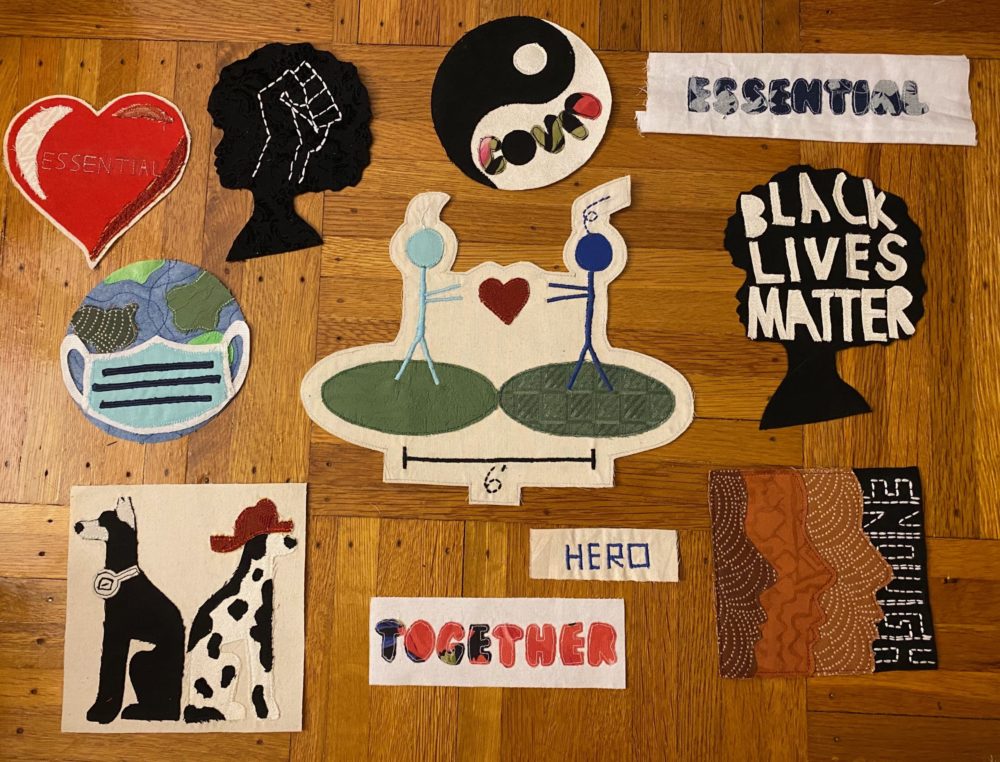The concept of “upcycling” itself — taking a used item headed for a landfill and turning it into something fresh — isn’t new. Startups like the University of Delaware-incubated AndAgain have been using the “treasures from trash” model for some time. But the COVID-19 pandemic created a sudden, under-the-radar problem that makes upcycling even more relevant in 2020.
The problem? People are getting rid of too many clothes in a relatively small time period.
It started soon after Delawareans were given orders to stay at home in March. Cooped up all day for weeks, lots of people got the same, perfectly reasonable idea to do a big cleaning, including getting rid of closets full of junk and clothing that hadn’t been worn in years. Soon, thrift stores like Goodwill became overwhelmed with donations. A lot of discarded clothing — around 80% of discarded textiles globally — simply goes into landfills.
Sierra RyanWallick and Michelle Yatvitskiy, UD students who participated in the 2020 Horn Entrepreneurship Summer Founders program, set out to take on the growing the problem by founding UP Cycle, a startup using a zero-waste process that takes discarded clothing and turns it into recycled raw material that can be used to make new consumer products.
“It’s a closed-loop upcycling process,” said Yatvitskiy. “We take [discarded] clothes, we sort it by fiber content, dividing it into knits and wovens, and we recycle it by cutting it and sewing it back together to create yards of sustainable fabric to create a variety of products.”
They plan to sell some of the new fabric as raw material to designers and seamstresses, but the startup is more than a small-batch textile producer. RyanWallick and Yatvitskiy want to make a difference both environmentally and community-wise — a combination that caught the attention of New Castle County’s Director of Economic Development Tamarra Morris Foulkes. With Foulkes’s help, UP Cycle is getting ready to launch its first community program in partnership with The Warehouse, which serves under-resourced teenagers in Wilmington.
“It’s like a dual program,” said RyanWallick. “They will learn about design sustainability, with an entrepreneurship [component]. They’ll be creating their own product that hopefully at the end will be sellable, and we’ll have this culminating event where we can sell the products and raise money for The Warehouse.”
Products may include patches that support social justice issues and masks.
“It’s important to [Warehouse Director of Operations] Melody Phillips that they include the civic engagement portion of the work that they do with the young people,” said Foulkes. As part of the UP Cycle program, students will research social issues that impact Delaware and identify where people can help. One goal is to have students design patches about the social issues they research and sell them to benefit relevant local organizations.
There’s also a workforce development component, as it prepares teens to join the state’s talent pipeline — something Foulkes says is vital to the state’s economic development.
The UP Cycle program “aligns with the goals of the state in that we’ve got to figure out how to make sure that when young people are graduating from high school they have support in many options,” Foulkes said. “We can show [businesses potentially bringing jobs to Delaware] that we’re taking high school students and putting them through entrepreneurship and coding programs, that by the time they’re seniors many completely know how to code or are ready to start a business.”
Experimental programs with young startups is an essential part of that, she said.
“We need to focus on finding out what works,” Foulkes said. “[Public] money goes to charter schools, and the way they are supposed to work is, you try something out, and if it works, you roll it out in all of the public schools. We should be able to fund this in the same way. If [UP Cycle] works, we need to expand it and grow it and make it accessible.”
The Warehouse UP Cycle pilot program is expected to launch with a virtual eight-week cohort in November. Keep an eye on The Warehouse website for updates.
Join the conversation!
Find news, events, jobs and people who share your interests on Technical.ly's open community Slack

Delaware daily roundup: Over 4,000 Black-owned businesses uncovered; Dover makes rising cities list; a push for online sports betting

Delaware daily roundup: Ladybug Fest illuminates small biz; Hahnemann Hospital's biotech future; intl. politics and a Middletown project

Delaware daily roundup: DE in DC for 'Communities in Action'; diversifying the coffee supply chain; Invista's future


